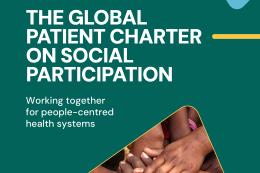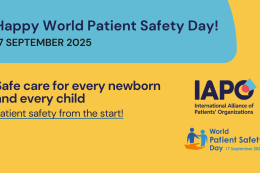Patient Empowerment: Incontinence and Pelvic Floor Dysfunction

The World Federation of incontinent Patients show importance and impact of patient empowerment can be illustrated via their annual World Continence Week campaign that is spearheaded for the most part by, for and with patients throughout the world. It serves as the epitome of just what is meant by patient empowerment.
Facts and figures of Incontinence
1 in 4 women over the age of 35 and 1 in 10 adult men are affected by some measure of bladder leakage/ incontinence. Worldwide over 400 million people suffer from this debilitating condition which has a huge impact on a person’s quality of life. However, continence issues are rarely given prominent attention in mainstream media discussions, let alone within the healthcare context. Historically, conditions affecting the bladder and bowel have often been uncomfortable or "taboo" subjects and accordingly these medical disorders have been underreported and under-diagnosed. Surveys have shown that fewer than 40% of persons with urinary incontinence mention their problem to a doctor or nurse and this figure is even higher for those with bowel incontinence. These conditions have been inadequately treated and poorly addressed by medical professionals, despite the substantial impact on individual health, self-esteem and quality of life. All too often, patients are incorrectly told that incontinence is just ‘a part of growing old’. Whereas the condition affects the quality of life of many women after childbirth as well as some male patients having undergone prostate surgery. No-one should have to learn to live with the embarrassment of incontinence, urinary or faecal, or related conditions. Treatments are available often leading to a cure, and or management.
So where does patient empowerment come in?
World Continence Week (WCW) is an annual initiative with the primary aim of drawing attention to and increasing public awareness about these conditions and to give sufferers the confidence to seek help and improve their quality of life. Generally, stigma and taboos are associated with incontinence and pelvic floor dysfunction. By holding such a week with a variety of events ranging from public forums to sponsored runs, community level trainings, and even the 2017 Guinness Book of Records trampolining event held in London in June, all go to show what can be achieved for and by patients themselves empower them to act in this case for such a worthy cause.
The effects of such a patient-led campaign are increasingly apparent and bear witness to the determination and drive shown by patients in combating the stigma and taboo aspects associated with bladder and bowel dysfunction. The public awareness raised through the WCW Trampolining event in London has been tremendous and has gone a long way in helping reduce stigma and taboo associated with bladder and bowel conditions.
The World Federation of Incontinent Patients (WFIP) is a global federation of national patient organizations for sufferers of incontinence and related pelvic floor disorders.


